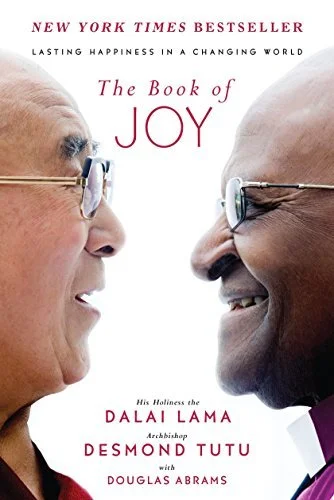Dalai Lama’s 50 Lessons for Happiness and Living a Joyful Life
“The Book of Joy: Lasting Happiness in a Changing World”.
Check out and subscribe to our YouTube channel here.
Reading time: 12 minutes
Introduction
In today’s post, we provide 50 proven strategies from the Dalai Lama for achieving lasting happiness and reducing negative emotions in daily life. This collection of insights were drawn from ‘The Book of Joy: Lasting Happiness in a Changing World’, by Nobel Peace Prize winners Dalai Lama and Desmond Tutu, written by Douglas Abrams.
The book covers a five-day dialogue around the challenges of living a joyful life in the face of adversity. It combines very rich insights from two spiritual celebrities that have undergone a great deal of oppression and exile in their own lives, yet have always been able to show high levels of compassion and forgiveness.
How can we turn fleeting moments of joy into a lasting sense of happiness? This book is ultimately about the very purpose of life–to avoid suffering and to discover happiness.
*Affiliate link: If you enjoy our content, consider purchasing your book through our link. We earn a small commission, which helps support the blog.
50 takeaways for experiencing more joy
1. Lasting happiness cannot be found in pursuit of goals and achievements. It does not reside either in fortune, fame, or power. Instead, we must look inward–it resides only in the human mind and heart.
2. While suffering is a natural part of the human experience, our choice lies in how we respond to it. Not even oppression or occupation can take away this freedom from us.
3. We create many of the things that undermine our own joy and happiness. It often comes from our emotional reactivity, from negative tendencies of the mind, or from our inability to appreciate and use the resources found within us.
4. Our world and education remain focused on external, materialistic values. This approach is insufficient to solve our human problems, which reside in the mind and the heart.
5. Why be unhappy about something if it can be remedied? And what use is there of being unhappy if it cannot be remedied?
6. Acknowledging the suffering of others helps reduce our own emotional pain. Approaching events from a wider perspective–from oneself towards others, from anguish to compassion–will reduce the worrying and our own suffering. It helps to see ourselves as part of a greater whole–there are many others who are or have been in the same situation and who have survived, even thrived.
7. Different events should be considered from different angles. The Dalai Lama’s own exile is a tragedy, but has at the same time allowed him personally to experience more freedom and opportunities for growth.
8. Seeking happiness through fleeting pleasures is like trying to quench thirst with saltwater–it only deepens your discomfort. We cannot discover lasting happiness through our senses, only find temporary enjoyment.
9. When you cultivate mental joy and happiness, physical pain becomes easier to bear. In contrast, if there is no joy at the mental level, but worry and fear, then even physical comforts and pleasure will not soothe your mental discomfort.
10. If you develop a strong sense of concern for all sentient beings, particularly for human beings, you will awake happy every morning. Try meditating just ten or thirty minutes a day on compassion and you will experience its lasting effects all day.
* Further Reading – Article continues below *
11. Set the following intention for your day at the start of each morning: that this day should be meaningful. Meaningful means, if possible, to serve and help others. If not, then at least to do no harm.
12. Avoid formality, which only creates barriers. Acknowledging that we all share a wish for a happy life brings us together. If we think we are special or not special enough, then we distance ourselves from our fellow humans and experience fear, nervousness, stress, and anxiety.
13. Cultivating friendships is key for a joyous experience. Genuine friendship is built on trust. If you have a genuine concern for the well-being of others, then trust will come.
14. Self-centeredness distances us from others and makes us feel insecure, which leads to fear. In extreme cases, fear can lead to anxiety, then frustration, then violence. Again, changing to a wider perspective that focuses on others is the best antidote for self-centeredness.
15. Practice unbiased love toward the entire humanity. Everyone wants the same–a happy existence and to reduce negative emotions. Even your enemies are your brothers and sisters; you might have to resist their actions, but you can still practice compassion towards them.
16. Much of what causes heartache is wanting things to be different than they are. Trying to control what is unable to be controlled will lead to stress and anxiety, which can lead to frustration and anger.
17. Learn to perceive others’ negative actions as a result of their own destructive emotions. You can then develop a sense of concern, compassion, and even feel sorry for their pain and suffering. Instead of frustration or anger, you may then experience concern for them.
18. Excessive ambition and unrealistic expectations are common causes of stress and anxiety. When we don’t fulfil the expectation or achieve the ambition we experience frustration. From the beginning it is a self-centered attitude–I want this, I want that. When we have a clear picture of our capacity, we can be more realistic about our effort.
19. Frustration and anger arise when our expectations are unmet or our desires unfulfilled. We wanted something, like respect or kindness, but we received something else, perhaps disrespect or criticism. Underlying this anger is the fear that we will not get what we need, that we will not be loved, that we will not be included. When we go to the root and identify how we are feeling threatened then we are able to soothe the anger.
20. Inevitable sadness and grieve in life events can be used as motivation and to generate a deeper sense of purpose. When someone close passes, we can choose to have the responsibility to fulfil their wishes. If they could see us full of hope and determination, they would be happy.
21. Keep a holistic view of the world and beware of the news, which highlights unusual and negative events. There are of course negative things occurring every day, but at the same time many more positive ones take place in our world that are not “news-worthy”. Keep this wider perspective and sense of proportion and you will not feel despair in the face of sad events.
22. Remember a Tibetan teaching that says that what causes suffering in life is how we relate to others: envy toward the above, competitiveness toward the equal, and contempt toward the lower.
23. Envy comes when we are too focused on material possessions and not on our true inner values. When we focus on experience or knowledge there is much less envy. Better still is to develop a genuine sense of concern for the well-being of others - our brothers and sisters have the same right and desire to have a happy life. Acknowledging this will allow you to rejoice in the good fortune of others.
24. In the midst of suffering, acknowledging the impermanent nature of a situation will allow us to pass through the difficulty more easily.
25. Once we accept death as normal and that sooner or later it will come, the less we will be afraid of it. Meditate daily on your mortality and the two levels of impermanence. At the higher level, life keeps changing and things cease to exist, including us. At a more subtle level, everything is always in a state of change.
25. The true measure of spiritual development is how one confronts one’s own mortality. The best way is to approach death with joy, the next best way is without fear, the next best is without regrets.
26. There are eight important pillars related to joy. Four are qualities of the –perspective, humility, humor, and acceptance, while four are qualities of the heart–forgiveness, gratitude, compassion, and generosity.
27. Each life event can be seen through multiple angles. When you look at the same event from a wider perspective, your sense of anxiety and worry reduces, and you are left with greater joy. While changing our emotions is quite hard, changing our perspective is relatively easy. The meaning you give to what you witness will change the way you feel.
28. By stepping back and taking the long view–considering our world’s problems in the long sweep of planetary history–we will place our daily concerns in a broader perspective and will allow us to go beyond our own self-centeredness.
29. When suffering think about people who are going or who have gone through a similar situation. It reminds us we are not alone and will lessen our pain. It is the birth of compassion, which means “suffering with”.
30. Humility is a key factor in achieving deep, lasting joy. When we adopt a wider perspective, we have a natural understanding of our place in the greater scheme of things. This leads to humility and the recognition that we can’t solve or control all aspects of life.
31. If you don’t have genuine love and kindness toward yourself, how can you extend it to others? Remembering that the basic human nature is good can give us some courage and self-confidence.
32. Humor is an effective tool of communication between two people, capable of bringing down differences and social barriers that separate us. Cultivating a sense of humility will enable us to laugh at ourselves and remind ourselves of our shared humanity. If you start to look for the humor in life, you will find it.
33. Once we observe life in its wider perspective, once we see our own role in its drama with some degree of humility, and once we are able to laugh at ourselves, we are then able to accept our life in all its pain, imperfection, and beauty.
34. Acceptance allows us to engage with life on its own terms rather than emote that life is not as we would wish. Unrealistic expectations of how life should increases stress and anxiety, and the struggle against the day-to-day current.
35. Our responsibility should be to pursue a meaningful goal with all the dedication we can muster, without being fixated on a preconceived notion of a result. Sometimes our efforts may lead to unexpected outcomes that may be better than what we had in mind.
36. Cultivate a curious mind. When we accept what is happening now instead of resisting it, we can now be curious for what will happen next.
37. When we accept the present, we can forgive and release the desire for a different past. Forgiveness is the only way to heal ourselves and to be free from the past.
38. The power of forgiveness lies in not losing sight of the humanity of the other person while responding to the wrong with clarity and firmness. Where the wrong action is concerned it may be necessary to take appropriate counteraction. However, towards the person we can choose not to develop anger and hatred.
39. Gratitude is recognizing the interconnectedness of all things that support our lives and all that has made it possible to have the life that we have and the moment we are experiencing. It’s not happiness that makes us grateful, it is gratefulness that makes us happy. Every moment is a gift.
40. Acceptance means not fighting reality, gratitude means embracing reality. We move from counting our burdens to counting our blessings. It is both an antidote to envy and a recipe for appreciating our own lives.
41. When you are grateful, you act our of a sense of enough and not out of a sense of scarcity, and you are willing to share.
42. Compassion (“suffering with”) is a sense of concern that arises when we are confronted with another’s suffering and feel motivated to see that suffering relieved. It is a skill that we can learn to develop and then use to extend our circle of concern beyond our immediate family to others.
43. Lack of self-compassion manifests itself in a harsh and judgmental relationship with ourselves. People think that unless they are critical and demanding they will be failures, unworthy of recognition and love.
44. Generosity is often the natural outgrowth of compassion and expresses explicitly a fundamental aspect of our interdependence and need for each other.
45. Generosity extends beyond financial giving; it’s about offering our time and energy to others. Having a sense of purpose is a critical ingredient to happiness, and purpose fundamentally is about how we are able to contribute and be generous to others.
46. The Buddhist tradition distinguishes three types of generosity: material giving, providing freedom from fear, and spiritual giving. The second can involve protection, counseling, or solace, while the third involves providing your wisdom and moral teachings, helping people be more self-sufficient and happier.
47. Practicing generosity of spirit helps cultivate all the other pillars of joy and happiness. In generosity, we see a wider perspective in which we see our connection to others; there is a humility that recognizes our small place in the world and that at another time it could be us in need; there is a sense of humor and ability to not take ourselves so seriously; there is an acceptance of life, where we do not force it to be a different way; there is forgiveness of others and a gratitude for all we have been given; and, finally, we see others with compassion and desire to help those who are in need.
48. The only way to truly change the world is through teaching compassion. Our society is lacking an adequate sense of compassion, kindness, and genuine regard for others.
49. The key to living a meaningful and fulfilling life is found within us, in developing compassion and responsibility toward others. If you live in this way, until your last breath you will be a happy person. That is the goal of human life.
50. Adversity, illness, and death are inevitable, but we have the power to choose whether to add mental suffering on top of these life challenges. When we make a different choice–to turn away from our self-centeredness–then we are able transcend our own suffering, heal, and turn to others.
Enjoyed this post? Don’t miss our insights on how to lead a good life in accordance with Stoic philosophy or on the incredible similarities existing between Buddhism and Stoicism principles.
🌿 Thanks for reading The Good Life Journey. I share weekly insights on money, purpose, and health, to help you build a life that compounds meaning over time. If this resonates, join readers from over 100 countries and subscribe to access our free FI tools and newsletter.
👉 New to Financial Independence? Check out our Start Here guide—the best place to begin your FI journey.
*Affiliate link: If you enjoy our content, consider purchasing your book through our link. We earn a small commission, which helps support the blog.
About the author:
Written by David, a former academic scientist with a PhD and over a decade of experience in data analysis, modeling, and market-based financial systems, including work related to carbon markets. I apply a research-driven, evidence-based approach to personal finance and FIRE, focusing on long-term investing, retirement planning, and financial decision-making under uncertainty.
This site documents my own journey toward financial independence, with related topics like work, health, and philosophy explored through a financial independence lens, as they influence saving, investing, and retirement planning decisions.
Check out other recent articles
Join readers from more than 100 countries, subscribe below!
Didn't Find What You Were After? Try Searching Here For Other Topics Or Articles:































